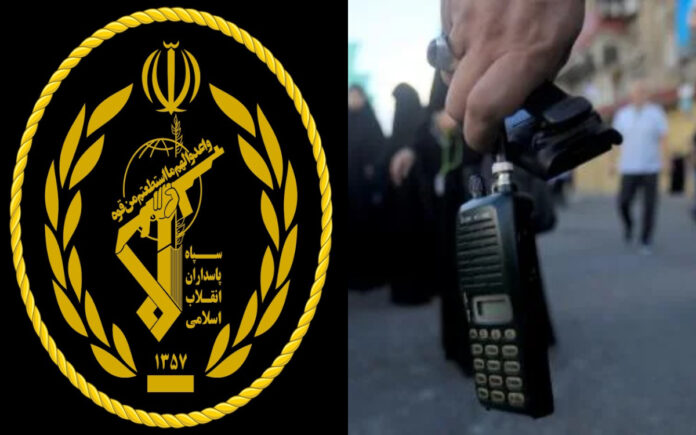Tehran: Iran’s elite Revolutionary Guards Corps (IRGC) has ordered all members to cease using communication devices following deadly attacks last week that caused thousands of pagers and walkie-talkies used by Hezbollah allies in Lebanon to explode, according to two senior Iranian security officials who spoke to Reuters.
One official noted that a large-scale IRGC operation is underway to inspect all devices, not limited to communication equipment. Many of these devices were either homemade or imported from China and Russia. Concerns about Israeli infiltration, including agents within Iran, have prompted a thorough investigation targeting mid- and high-ranking IRGC personnel.
“This includes scrutiny of their bank accounts both in Iran and abroad, as well as their travel history and that of their families,” the official stated.
The Iranian Foreign, Defence, and Interior Ministries did not respond immediately to requests for comments on these developments.
In a coordinated attack, pager devices detonated across Hezbollah’s strongholds on Tuesday, followed by the explosion of hundreds of Hezbollah walkie-talkies the next day. These attacks resulted in 39 deaths and over 3,000 injuries. Both Lebanon and Hezbollah attribute responsibility for the attacks to Israel, which has not confirmed or denied involvement.
Details regarding how the 190,000-strong IRGC communicates remain undisclosed. “For now, we are using end-to-end encryption in messaging systems,” the official said.
Amid widespread concern within Iran’s ruling establishment, IRGC officials have sought technical assessments from Hezbollah, with several exploded devices sent to Tehran for analysis by Iranian experts.
Also Read | Israel Launches Major Airstrikes Against Hezbollah in Lebanon
Concerns Over Missile and Nuclear Facility Security
Another Iranian official highlighted the main concern regarding the security of the country’s nuclear and missile facilities, particularly those located underground. “But since last year, security measures at those sites have increased significantly,” he noted, referring to intensified protocols following Israel’s alleged attempts to sabotage Iran’s missile program in 2023.
“There has never, ever been such tight security and extreme measures in place as there are now,” he added, indicating that security has significantly escalated in response to the pager explosions in Lebanon.
The IRGC serves as a powerful political, military, and economic entity in Iran, with close ties to Supreme Leader Ayatollah Ali Khamenei. Established after the 1979 Islamic Revolution to safeguard the clerical ruling system, it maintains its own ground force, navy, and air force, overseeing Iran’s strategic weaponry.
It extends its influence throughout the Middle East via its overseas operations arm, the Al Quds Force, providing financial support, weapons, technology, and training to allied groups, including Hezbollah in Lebanon, Hamas in Gaza, Yemen’s Houthis, and militias in Iraq.
The Iranian military employs various encrypted communication devices, including walkie-talkies, for secure communications. While specific models may vary, these devices are often developed domestically or sourced from a mix of local and foreign suppliers. Notably, Iran’s armed forces have not utilized pagers for over two decades.
Also Read | UN Leaders Face Challenges as Haiti’s Gang Crisis Intensifies
Tehran has established its own military-grade radio transmissions through its defense industry to reduce reliance on foreign imports, particularly due to Western sanctions related to its nuclear program. However, in the past, Iran has imported communication devices from countries such as China, Russia, and Japan.
Iran and Israel have engaged in a longstanding shadow war, marked by mutual allegations of sabotage and assassination attempts. The conflict has intensified over the past year alongside the Gaza war, which escalated after Hamas attacked southern Israeli communities on October 7.
Iran and Hezbollah have accused Israel of assassinating Hamas leader Ismail Haniyeh in Tehran and Hezbollah’s senior military commander, Fuad Shukr, in Beirut shortly after in July. While Israel confirmed Shukr’s killing, it has not verified involvement in Haniyeh’s death.
Iran does not recognize Israel’s right to exist. Khamenei has previously labeled Israel a “cancerous tumor” that “will undoubtedly be uprooted and destroyed.”
Israel perceives Iran as an existential threat and accuses it of secretly pursuing nuclear weapons development, claims that Iran firmly denies.



